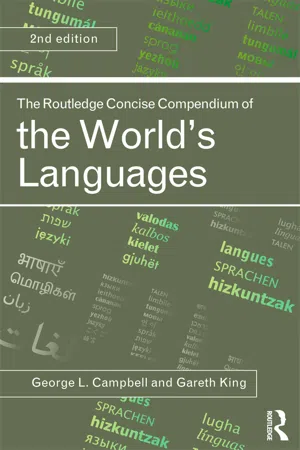
- 912 pages
- English
- PDF
- Available on iOS & Android
The Routledge Concise Compendium of the World's Languages
About This Book
This second edition of The Routledge Concise Compendium of the World's Languages has been completely revised to provide up-to-date and accurate descriptions of a wide cross-section of natural-language systems. All cultural and historical notes as well as statistical data for each language have been checked, updated and in many cases expanded.
Now offering an even broader range of languages including a greater number of the lesser-known ones, such as Cree, Maltese and Haitian Creole, this new edition of The Routledge Concise Compendium covers a total of 111 languages.
Key features include:
- complete rewriting and systematization of the phonology sections for all languages
- provision of IPA symbol grids arranged by articulatory feature and by alphabetic resemblance to facilitate use of the new phonology sections
- expansion of morphology descriptions for all languages
- provision of new illustrative text samples
- addition of a glossary of technical terms
- comparative tables of the numerals 1-10 in all languages covered, and also grouped by family
- classification by genetic relationship of all languages covered.
Using the wealth of recent developments and research in language typology and broadened availability of descriptive data, this new incarnation of The Routledge Concise Compendium brings a much-loved survey emphatically into the twenty-first century for a new generation of readers.
The Routledge Concise Compendium of the World's Languages remains the ideal compact reference for all interested linguistics and professionals alike.
Gary King is Series Advisor for the Roultedge Colloquials and the author of numerous books on language and linguistics. He is also UCAS co-ordinator and a lecturer at a large sixth-form college.
George L. Campbell worked for the BBC World Service and was a polyglot linguist and translator.
Frequently asked questions
Information
Table of contents
- Cover
- Title
- Copyright
- Contents
- Preface
- Glossary of technical terms
- IPA symbols by feature/point of articulation
- IPA symbols by alphabetic similarity
- Abbreviations
- Afrikaans
- Ainu
- Akan (Twi)
- Albanian
- Amharic
- Arabic
- Armenian
- Aymará
- Balinese
- Basque
- Belarusian
- Bengali
- Berber
- Breton
- Buginese
- Bulgarian
- Burmese
- Cambodian (Khmer)
- Catalan
- Chinese
- Chukchi
- Cree
- Czech
- Danish
- Dutch
- English
- Estonian
- Ewe
- Finnish
- French
- Fula
- Georgian
- German
- Greek
- Guaraní
- Gujarati
- Haitian Creole
- Hausa
- Hebrew
- Hindi
- Hungarian
- Icelandic
- Igbo
- Inuit
- Irish
- Italian
- Japanese
- Kannada
- Kazakh
- Ket
- Korean
- Lakota
- Latin
- Latvian
- Lingala
- Lithuanian
- Malagasy
- Malayalam
- Malay-Indonesian
- Maltese
- Maori
- Mapudungu
- Marathi
- Mende
- Mongolian
- Nahuatl
- Nama
- Navajo
- Nepali
- Nivkh
- Norwegian
- Oromo
- Panjabi
- Pashto
- Persian
- Polish
- Portuguese
- Quechua
- Romanian
- Romany
- Russian
- Sami
- Samoan
- Sanskrit
- Scottish Gaelic
- Serbo-Croat (Croatian and Serbian)
- Shona
- Sinhala
- Slovak
- Slovene
- Somali
- Spanish
- Sundanese
- Swahili
- Swedish
- Tagalog
- Tamil
- Telugu
- Thai
- Tibetan
- Turkish
- Ukrainian
- Urdu
- Uzbek
- Vietnamese
- Welsh
- Wolof
- Yiddish
- Yoruba
- Zulu
- Comparative grid of numbers 1–10 (alphabetical listing)
- Comparative grid of numbers 1–10 (genetic listing)
- Appendix of scripts
- Classification of languages by family relationship
- Bibliography